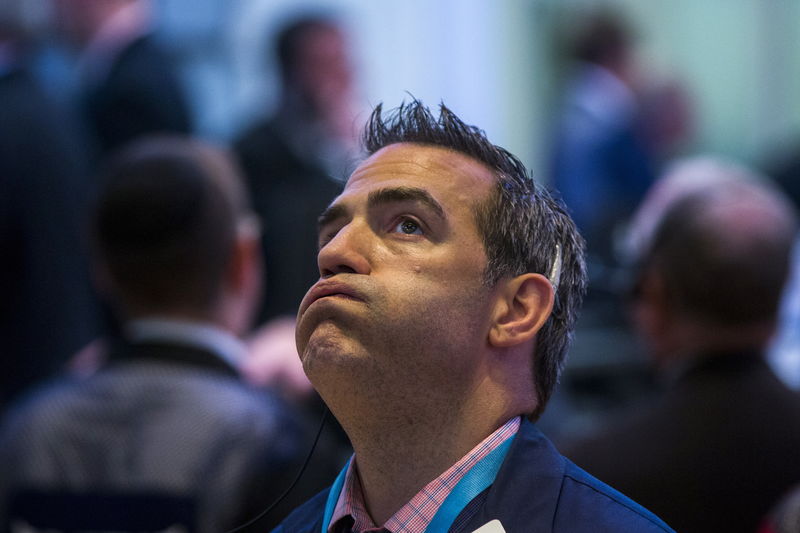After closing 1.2% lower on Thursday, the ASX is set to open higher today with the SPI futures up 7 points (+0.09%) at 8:45 am AEST following a mixed night overseas that was highlighted by a weakness in tech stocks.
In the US, The threat of even higher still interest rates is weighing on tech stocks. US initial jobless claims continue to flag a strong jobs market even after attempts by the Federal Reserve to slow the economy — hiking its main interest rate to the highest level in more than two decades in hopes of driving down inflation.
While high interest rates drag on prices for all kinds of stocks, tech stocks and others that have been bid up on expectations of high future growth are hit the hardest.
Apple (NASDAQ:AAPL) is also up against a ban on iPhones for Chinese government staff. The stock was sold off by 3.6% in New York on Wednesday, then extended its loss last night, losing another 2.9%.
Reports of a Chinese government iPhone ban carried over to rare earth prices, which have hit near 2-year highs on Myanmar supply risks.
Trading volumes of cryptocurrency fell to their lowest level of the year in August amid waning investor interest since digital asset prices collapsed from their late-2021 all-time highs.
Philip Lowe’s Some Closing Remarks speech
Outgoing RBA governor Philip Lowe has challenged the Albanese government to reduce its reliance on the RBA and hand some areas of fiscal policy to an independent body.
Lowe warned there was a “material risk” that Australia’s living standards would stagnate without urgent government action to address the “political problem” of low productivity, which is at seven year lows.
In his final speech as governor, he warned that Australia was unlikely to return to the world of low and stable inflation from before the pandemic, and said the government, not the RBA, was to blame for high house prices.
What happened overnight?
Here’s what we saw (source CommSec):
US markets
US sharemarkets closed mostly lower on Thursday, with the biggest drag from Apple (-2.9%) and weakness in chip stocks over concerns about China's iPhone curbs, while a fall in weekly US jobless claims fed worries about interest rates and sticky inflation.
The Philadelphia semiconductor index fell by 2% while shares of Apple suppliers including Skyworks Solutions (NASDAQ:NASDAQ:SWKS), Qualcomm (NASDAQ:QCOM) and Qorvo were all down more than 7%. Shares of Nvidia and Advanced Micro Devices (NASDAQ:AMD) fell by between 1.7% and 2.5%.
The Dow Jones index rose by 57.5 points or 0.2%, outperforming the S&P and Nasdaq because Apple ranks just 11th in the cyclicals-heavy index. And the S&P 500 index slid 0.3% and the Nasdaq index shed 124 points or 0.9%.
European markets
European sharemarkets were dragged down by tech (-2%) longest losing streak since February 2018, falling for a seventh day. Semiconductor firms slid on reports that China has in recent weeks widened existing curbs on the use of iPhones by state employees.
Apple supplier STMicroelectronics (NYSE:STM) slumped 4.1%, while BE Semiconductor, Nordic Semiconductor, ASM International, Infineon and ASML slid between 2.6% and 6.3%.
Miners fell 2.2% as prices of metals fell against a strong US dollar and on demand concerns from China. German industrial production fell by 0.8% in July (survey: -0.4%). The continent-wide FTSEurofirst 300 index edged lower by 0.1%. But in London, the UK FTSE 100 index rose by 0.2%.
Currencies
Currencies were mostly weaker against the US dollar in European and US trade.
- The Euro fell from US$1.0723 to US$1.0686 and was near US$1.0695 at the US close.
- The Aussie dollar slid from US63.93 cents to US63.66 cents and was near US63.75 cents at the US close.
- The Japanese yen firmed from 147.60 yen per US dollar to JPY147.04 and was near JPY147.25 at the US close.
Global oil prices fell after a nine-session rally on Thursday on a stronger US dollar and expectations of weaker international demand. US crude oil stockpiles drew down by 6.3 million barrels last week, falling for a fourth consecutive week and down over 6% in the last month.
The Brent crude price fell by US68 cents or 0.8% to US$89.92 a barrel. The US Nymex crude price shed US67 cents or 0.8% to US$86.87 a barrel.
Base metal prices fell on Thursday. The copper futures price dipped 0.6% after a rise in inventories and weak imports by China highlighted supply and demand concerns. LME data showed inventories rose 21% to 133,850 metric tons to the highest level since October. The aluminium futures price fell by 0.2%.
The gold futures price fell by US$1.70 or 0.1% to US$1,942.50 an ounce. Spot gold was trading near US$1,919 an ounce at the US close. Iron ore futures shed US$1.57 or 1.3% to US$117.40 a tonne.
Looking Ahead
In Australia, the labour account and business turnover data are scheduled. In the US, consumer credit data is released with wholesale inventories and used car prices. Chinese inflation data is scheduled on Saturday.
On the small cap front
The S&P ASX Small Ordinaries gained 1.09% yesterday. You can read more about the following throughout the day.
- Incannex Healthcare Ltd (ASX:IHL, NASDAQ:IXHL) will be presenting at the H.C. Wainwright 25th Annual Global Investment Conference next week.
- Elixir Energy Ltd (ASX:EXR) declared a discovery at Big Slope at its Mongolia gas project; Announced share purchase plan.
- Akora Resources Ltd (ASX:AKO) has released its presentation from the Africa Down Under conference.
